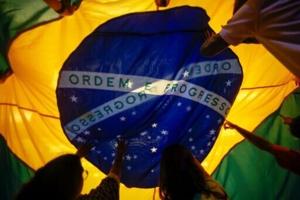Brazil’s Central Bank has maintained its benchmark interest rate at 15 percent, a decision heavily influenced by the pronounced “uncertainty” stemming from new punitive tariffs announced by the United States. This pivotal move by the Brazilian monetary authority signals a cautious approach in response to evolving international trade dynamics, particularly those impacting the South American economic powerhouse.
The central bank’s rate retention follows a series of seven consecutive rate hikes, a strategy that had previously drawn sharp criticism from leftist President Luiz Inacio Lula da Silva. Lula has consistently argued that such elevated interest rates act as a significant impediment to Brazil’s economic growth, stifling investment and expansion across various sectors.
The monetary policy committee, known as Copom, explicitly stated its diligent observation of “announcements related to the imposition of trade tariffs on Brazil by the United States.” This proactive monitoring underscores the gravity with which Brasília views the potential repercussions of these international economic measures on its domestic financial stability and export markets.
Washington’s declaration of a 50 percent tariff on a broad range of Brazilian goods marks a critical escalation in trade relations. While key Brazilian exports such as aircraft, orange juice, pulp, Brazil nuts, and certain iron, steel, and aluminum products have been granted exemptions, the general imposition of these duties is poised to significantly impact bilateral trade flows.
This aggressive US Tariffs policy is widely perceived as President Donald Trump fulfilling a prior threat to leverage American economic might. The target, in this instance, is Brazil, ostensibly to penalize the nation for what Trump has controversially labeled a “witch hunt” against his staunch far-right ally, Jair Bolsonaro, who is currently facing trial on allegations of an attempted coup.
Remarkably, these measures against Brazil diverge sharply from the typical economic justifications often cited for global trade war policies implemented by the Trump administration. Instead, the tariffs have been framed in overtly political terms, disregarding a long-standing history of trade ties and a significant trade surplus that Brasilia recorded at $284 million last year.
The Selic, Brazil’s benchmark interest rate, remains at its highest level since 2006, positioning it among the loftiest worldwide. This persistently high monetary policy stance reflects underlying inflationary pressures and the central bank’s ongoing commitment to price stability amidst domestic and international economic headwinds, including the looming impact of the US Tariffs.
The sustained high interest rates, coupled with the new US Tariffs, create a complex economic landscape for Brazil. Stakeholders across industries are closely watching how these factors will interact and shape the nation’s future economic trajectory, with potential implications for investment, employment, and overall market confidence.






Leave a Reply